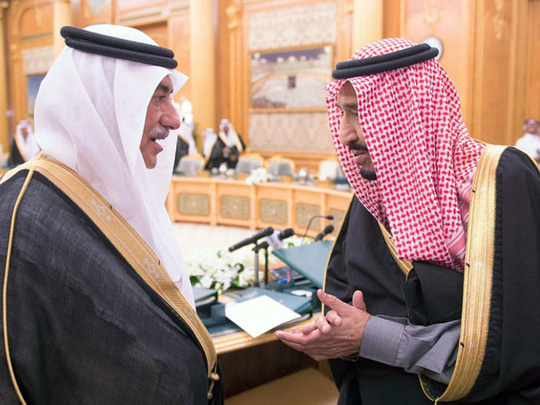
Dubai: Saudi Arabia projected a budget deficit of 145 billion riyals (Dh141.98 billion) in 2015 for the first time since 2009 even as the world’s biggest exporter of crude oil budgeted record spending on education and health care, the ministry of finance said on Thursday.
Saudi projected this budget deficit as the kingdom budgeted for record spending of 860 billion riyals on revenues of 715 billion riyals. Normally oil accounts for 90 per cent of the kingdom’s revenues.
“The budget will continue to focus on priority investment programmes that enhance sustainable and strong economic development and employment opportunities,” the ministry of finance said in a statement.
Saudi Arabia budgeted a 0.6 per cent rise in expenditure with a 16 per cent fall in income, leading to a deficit, for the first time since 2009, when it recorded a shortfall of 65 billion riyals.
The budget was prepared “during challenging international economic and financial circumstances,” the ministry said, however, the government will continue its efforts to rationalise current spending, especially salaries, wage and allowances, which contributes to about 50 per cent of the total budgeted expenditure.
“We expect Saudi’s GDP [gross domestic product] to slow down to a half from the current 8 per cent,” Jaap Meijer, managing director at Arqaam Capital, told Gulf News.
The Tadawul All Share Index trimmed early gains on growth concerns. The benchmark ended the session 0.57 per cent higher at 8,749.34, reversing from an early high of 8,811.31. The index has gained 5.67 per cent so far in the year.
Higher crude price
The government has factored in slightly higher crude oil prices for the budget, about 25 per cent higher than Thursday’s close, according to Arqaam Capital. “The budget is based on crude price projection of $75 per barrel,” Meijer said. Brent crude slipped 2.4 per cent on Wednesday to $60.24 a barrel, bringing its drop in the past six months to 47 per cent.
Estimated deficit makes up only 5 per cent of total Saudi foreign reserves and 5 per cent of GDP, implying that Saudi would be able to last for 19 years at the current estimated deficit, Meijer said.
The surge in oil prices over the past decade helped Saudi Arabia boost its net foreign assets to a record 2.9 trillion riyals in October, according to central bank data.










